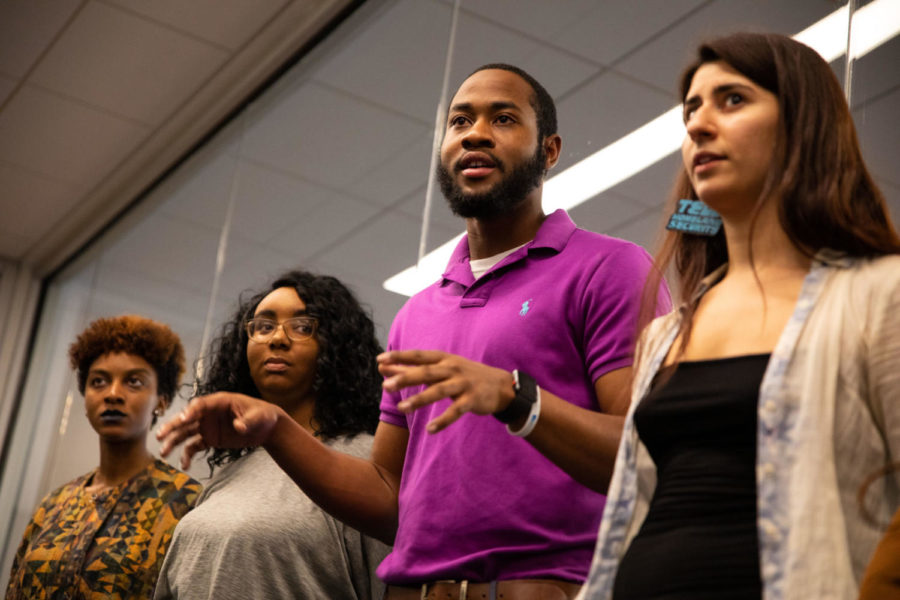Write-in candidates for SGA hold forum to hear students’ voices
SGA presidential candidate Juwan Page speaks to the attendees of the Page-Azad All Call on Wednesday, Feb. 27, 2019, at the MLK Center in the Gatton Student Center in Lexington, Kentucky. Page and Azad announced their candidacy for SGA president and vice-president on Tuesday night. Photo by Jordan Prather | Staff
February 28, 2019
Candidate for Student Government Association president and 2018 homecoming king Juwan Page said that his team has probably had less than seven hours of sleep combined in the past 24 hours. Nevertheless, he uses the word “synergy” to describe his campaign.
Page, an equine science junior, and his running mate Lidya Azad, a gender and women’s studies junior, announced their bid for the SGA presidency and vice presidency late Tuesday evening as write-in candidates. The polls opened Wednesday morning and will close Thursday at 4 p.m.
The Page-Azad campaign held an open forum in the Martin Luther King Center. An estimated 30 people attended, and the campaign livestreamed the event for 132 views. The campaign, which was described as a grassroots effort among several underrepresented student leaders on campus, opened the floor for questions about Page and Azad and their goals moving forward.
“Anything you know before me, it don’t matter. I came here falling on my own sword,” Page told the group. “I was like, ‘I don’t know anything about meeting with the Board of Trustees.’ Lidya does and Jeliah (Logan, Page’s Chief of Staff pick) has a lot of experience representing across the board on campus. I don’t have anything but a heart and a passion and a lot of time.”
Azad said that the campaign came together after students on campus asked her and other student leaders about who they should vote for in the current SGA election. The other candidate duos include incumbent SGA President Michael Hamilton along with Kat Speeceand challengers Tucker Lovett and running mate Andy Flood.
Azad said students that are historically underrepresented— students of color, Appalachian students, graduate students, LGBTQ* students and more— felt like neither of those campaigns represented them. Others did not know about the election in general. So a long conversation was had about what could be done. Others encouraged Page, for his social presence on campus, and Azad, for her efforts as a campus advocate in organizations like SSTOP Hunger, to run for office.
“Neither one of us ever dreamt about running for SGA prior to four or five days ago,” Azad said.
Page said he feels that outreach to minority organizations on campus was a part of last year’s election cycle, but that did not happen this year. He said that he was “offended and hurt that nobody reached out to us.” He mentioned that candidates had reached out to have one-on-one meetings in the past, but this year, many minority students were not made aware of the election. Lovett and Flood have made similar statements about the lack of election awareness and even went so far to not go to SGA’s presidential debate Tuesday night.
“Obviously it started with underrepresented populations, but that doesn’t mean we are only representing them,” Page said.
Page said while his campaign is aimed at representing voices that are often forgotten on campus, he would represent all students on campus. While at the forum on Wednesday, Page said he planned to have regular events and meetings like that if he wins the election so the campus community can express their voices and thoughts to him directly.
Page and Azad’s platformis still growing and changing as they meet with students on campus and listen to their concerns. Their main points are to:
- Build a place of belonging for affected students
- Create a UK where every student can pay for food and housing
- Support graduate students
Page also added that he is supportive of UK’s Pillars of Academic Excellence— academic success, financial stability, health wellness and belonging and engagement— and will seek to integrate those into his administration.
“Everybody is a little underrepresented in some kind of way,” Page said. “And if we can really get into those corners, as far as our network, what we have and the between the four pillars, that really is the umbrella for everything else.”
Current SGA Senator and Integrated Strategic Communication sophomore Chandler Frierson attended the forum and has been supporting Page and Azad’s bid for office. He said that the campaign is an avenue for students to have their voices heard. He said that by writing in Page-Azad, students can show how much power is behind this campaign and that those students have the power to change the current situation if they so choose.
“It’s a statement of the power that people of historically underrepresented backgrounds can have when we put our minds together,” Frierson said.
No matter the outcome of the election, Page and Azad feel that they have started a movement that will keep going after the polls close.
“What good would it be for us to have a concrete platform, try to achieve that platform and then see what the people want?” Page said. “I think it should be what do the people want and us base our platform on that.”
































































































































































